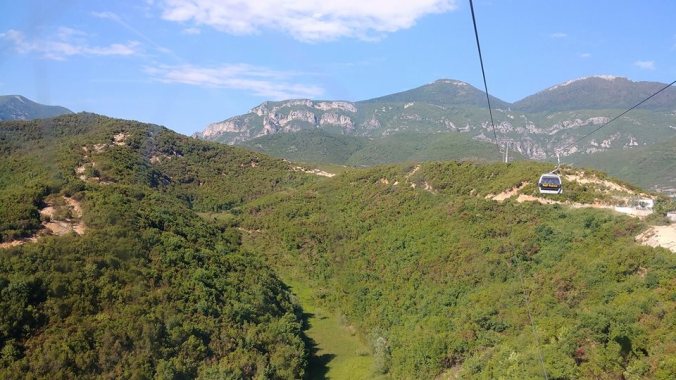
When I first found out I would be traveling to Albania for work, I had to look it up on a map. When I arrived, I found that everyone I met but two people (who, relevantly or not, went to high school together back in the 80’s) pronounced it “All-BAHN-ya” and not “Al-BANE-eeya” as I have heard it (when I heard it, which is not all that often). When a trip starts with “I don’t know where it is and I don’t know how to say it” I know I’m in unfamiliar territory.
Normally when I travel for work it is for very specific tasks within my area of responsibility. I had a role in the conference I was attending, but a relatively minor one, and many of the sessions were out of my usual area. It gave me a chance to talk to more people, and listen to more people, and learn more things.
My two favorite things about working with an international nonprofit are the fact that I have colleagues all over the world, and the fact that they are all doing work to make their corner of the world a better place. I don’t often get excited about a week of meetings but I was looking forward to spending a few days with a good cross section of the organization. Finding a place where you can bring people from a wide range of countries keeps getting tougher. We would not have been able to have the attendance we had if we had the conference in, say, the U.S. Or England, or France, or most of Western Europe. And so: Albania.
Mostly I knew instead of seeing Albania I would be seeing the inside of the hotel, as usually happens when you go to a conference where the meetings take place in the same hotel where the attendees are staying. I planned one extra day to look around the area, but I didn’t make any specific plans to do anything. When I got there I found that some other people were also staying, either out of interest or due to flight schedules. We mentioned to our host that we would like his recommendation on what to do, and five minutes later he had organized a tour for us.
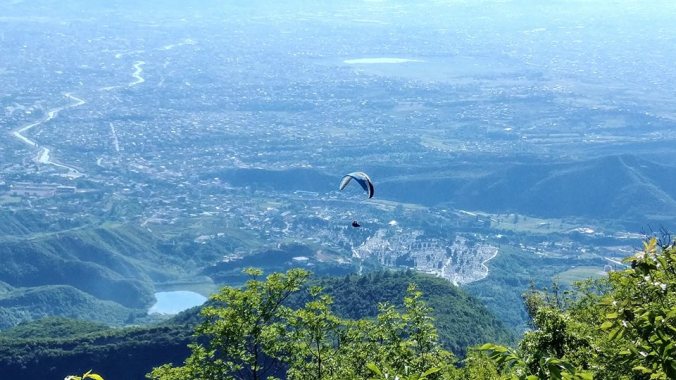
So what I wound up doing on my free day was a tour with nine of my colleagues and a tour guide friend of our host. In that group of ten we had four from the U.S. (all different states), two from South Africa, and one each from Haiti, Afghanistan, Myanmar, and Australia. As I had experienced all week, every conversation – both work and non-work -generated some piece of unexpected information.
Some of my favorites:
A colleague in Turkey who told us that they were focused on the Syrian refugee crisis because a) there are 2.5 million (MILLION) Syrian refugees in Turkey, and b) it is the LEAST politically hot topic within their areas of focus in their country.
This good humored exchange between three colleagues, one of whom had lived for several years in West Africa:
C1: “You not only had a donkey, you had a donkey driver?”
C2: “Well, I couldn’t beat the donkey – you know, to make it go faster.”
C1: “So you hired someone else to beat the donkey?”
C3: “At the end of the day, the donkey still got beaten.”
This which I will file under “things I never expected to hear myself say,” in a conversation about national sports: “Just so I’m clear – is it the headless body of the goat that they drag from their horses, or the goat head?” (FYI it is the headless body of the goat and the sport is called Buzkashi)
This insight on Albanian agriculture, the parts of which I saw were all fully manual – cutting hay with a scythe, gathering crops into wheelbarrows, or at most into carts pulled by tiny donkeys, but sometimes pulled by the farmer on a bicycle: “The vegetables are all grown organically with no OMG.” (which is probably the right order in Albanian)
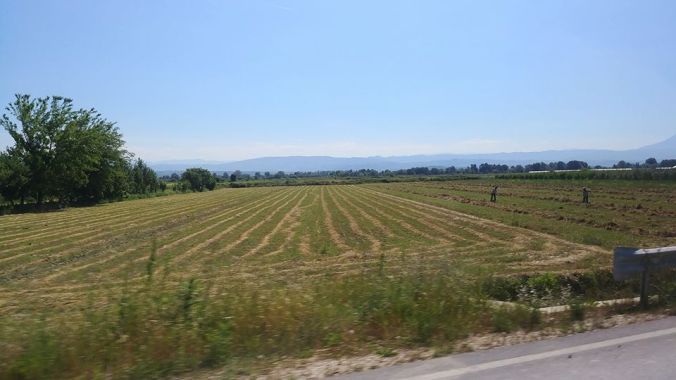
On my one evening plus one day of touring I took a million photos and was dumbstruck by the beauty of the place. But it is the people and the stories that will stay with me, I think.
Most notably our very generous and funny tour guide, when one of our group asked him what it was like to live in Albania under Nver Hoxha, the communist leader of Albania from 1944 – 1985.
He spoke eloquently about having a vision at age 9 that Nver Hoxha held all of Albania in the palm of his hand, guiding and protecting them. He asked his father what would happen if Nver Hoxha died, and his father said “Nver Hoxha will never die!” Years later, after the end of communist rule, he asked his father why he said that. His father told him it was because he was afraid for his son, that if he said what he felt (“I wish Nver Hoxha would drop dead tomorrow”) and his son repeated it, in fairly short order he would have a father in jail, or no father at all. It was not at all uncommon for neighbors or even family members to inform on one another.
If you read current tourist reviews of Albania, many people mention that the roads are terrible or that the drivers are crazy. Few if any mention that until 1992, when the communist regime fell, there were no cars that were not state-owned. You did not go where you wanted to go, you went where you were sent. The entire population of Albania has been driving for 8 years fewer than I have had my driver’s license. There are reasons their driving infrastructure is new and not very developed.
It was not until he was in University that our guide first heard the word “dictator” applied to their leader, on a western radio broadcast. He participated in hunger strikes and otherwise became part of the student protests. Many of the communist structures – a strikingly ugly pyramid in the city of Tirana, the well over 150,000 mushroom shaped bunkers strewn throughout the country – are in a state of neglect and disrepair, though they remain standing. Our guide pointed out a huge formation on a mountain in view of Berat Castle. It used to say NVER, spelled out in white rocks. After the end of communism, it was changed to spell NEVER, as in never again.
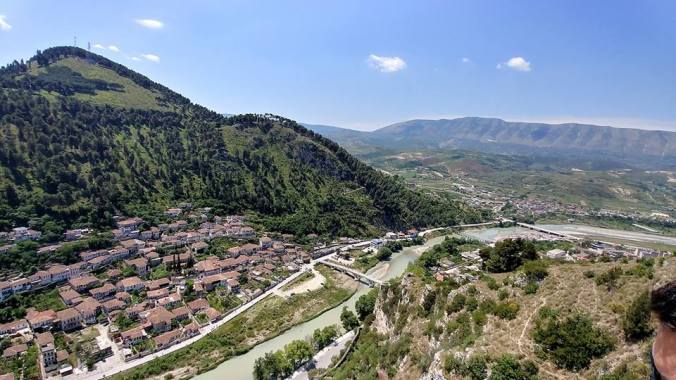
He also spoke of the current political climate in Albania, where the two main parties are fighting for fair elections (they reached an agreement while we were there, and there was much rejoicing when the election was finally scheduled). He said that many of the older citizens and politicians are still brainwashed by the 50 years of communist rule, and that “It doesn’t matter what it says on your lapel, if you write democrat there or whatever, if in your head you are still a communist, you are still a communist.”
Even on the tour, I learned a lot from my colleagues. The town of Berat where we visited and had lunch has an Orthodox side and a Muslim side. We were able to tour two mosques on the Muslim side, and having not only our tour guide but two practicing Muslims to explain what we were seeing was just one of many things I consider myself lucky to have experienced.
None of this sounds particularly earth-shattering, but something in me feels broken open in the best way following this trip. I can’t claim that anyone else’s experience of Albania will be anything like mine, but I’m awfully glad I had it.
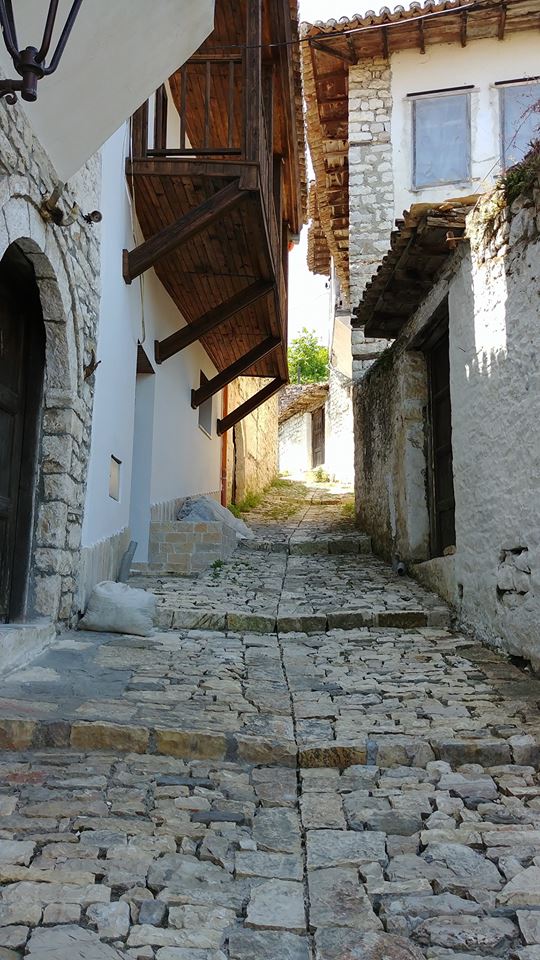
Amazing. I, too, have no idea how to pronounce Albania or where to find it. Why was Albania the best meeting place? In the middle of everyone? Travel restrictions for some participants? Such an amazing opportunity. I know I used the word ‘amazing’ twice; the trip deserves it.
LikeLiked by 1 person
Combination of location and accessibility, yes. And probably cost is a consideration. I would have used “amazing” in every paragraph but I though that would render it unreadable.
LikeLike
I love a blog like this that helps educate those of us who will never make it to Al-Bay-Nee-Uh (as I pronounce it). There’s an old “Cheers” episode in which Sam & the Coach are taking a geography class, and …. well I’ll let you see.
LikeLiked by 1 person
Ha! I forgot all about that. Perfect.
LikeLike
in my book, broken-open heart = success.
LikeLiked by 1 person
My book too.
LikeLike
Lovely, Tessa! I sure have enjoyed your photo tour and now this. You may be a reluctant traveler, but at least you go places, and show them the Best Side of America!
LikeLiked by 1 person